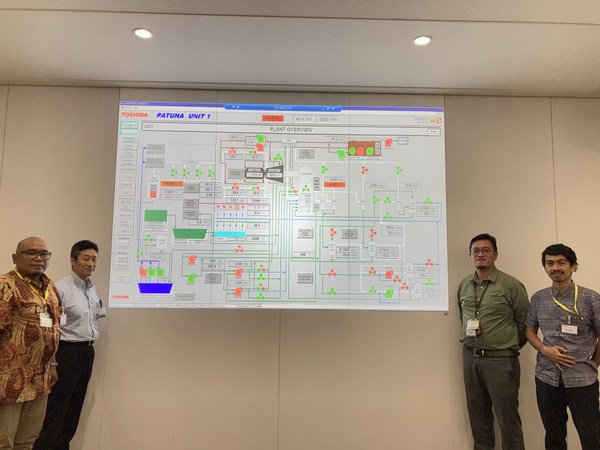 |
KAWASAKI, Japan, Aug. 23, 2022 /PRNewswire/ -- Toshiba Energy Systems & Solutions Corporation (hereinafter "Toshiba ESS"), through its Indonesian subsidiary Toshiba Asia Pacific Indonesia, which is engaged in the energy and infrastructure business, has concluded a contract with Indonesia's PT Geo Dipa Energi (Persero) (hereinafter "GDE") for an IoT service aimed at improving the utilization rate of the power generation facilities at its Patuha geothermal power plant[1]. This service uses IoT and AI technologies, including predictive failure diagnosis and performance monitoring at the plant. This contract is the group's first commercial application of IoT Services for geothermal power plants.
This service represents a commercial version of what has been implemented as a NEDO (New Energy and Industrial Technology Development Organization) demonstration project for this power plant in October 2019[2]. The demonstration project verified the effectiveness of the company's IoT-based predictive failure diagnosis technology and helped with the contract's conclusion. The system provided through this service employs EtaPRO™[3], a software suite acquired by Toshiba ESS last year, and represents the world's first commercial application of EtaPRO™ to a geothermal power plant.
This system is distinguished technologically by its use of AI to analyze real-time power plant operation data obtained from various sensors and detect signs of anomalies that may cause problems during normal operation. In doing so, it reduces the number and duration of power plant shutdowns; a demonstration project conducted by NEDO showed that it was able to reduce the rate at which problems occurred by over 20%. Another significant feature is the ability to detect signs of anomalies under conditions specific to geothermal power plants, such as the unstable condition of the steam flowing into the turbine, which is not the case with thermal power plants.
In Indonesia, the total installed power generating capacity was approximately 62 GW as of 2020, with coal-fired power generation accounting for about half of this total. Meanwhile, in accordance with the Paris Agreement, the Indonesian government has pledged to reduce greenhouse gas emissions by 29% by 2030, Electricity Business Plan (RUPTL) says geothermal power generation will account for about 3.4 GW (about 8%) of the 40.6 GW of power generation capacity to be added by 2030[4]. Toshiba ESS has delivered equipment to several geothermal power plants in Indonesia. It will be proactive in proposing the IoT solutions that enable optimal operation that will help to solve issues faced by individual current and future customers.
By deploying this service worldwide, Toshiba ESS aims to reduce the customer's cost of power generation by helping improve power plants' utilization rates, thereby promoting the spread of geothermal power generation and helping to achieve carbon neutrality.
[1] A group of geothermal power plants operated and managed by GDE, Indonesia's state-owned geothermal power company. The project began operation in 2014, and has a rated output of 60,000 kW. |
[2] NEDO (New Energy and industrial Technology Development Organization)'s technology development project for advanced application of geothermal energy |
https://www.global.toshiba/ww/news/energy/2019/10/news-20191023-01.html |
https://www.nedo.go.jp/activities/ZZJP_100066.html(Only in Japanese) |
[3] Plant monitoring software for power generation operators that has been installed for more than 30 years at power plants in 60+ countries with an approximate total capacity of 700 GW, including thermal, hydro, wind, and solar plants |
https://www.global.toshiba/ww/news/energy/2021/10/news-20211005-01.html |
[4] From the Electricity Business Plan (RUPTL) for 2021–2030 |

Service Users from GDE and Development Chief from Toshiba ESS. From the Picture left, Mr. Fajar Dhani Wardhana(GDE), Mr.Hiroyuki Ichikawa(Toshiba ESS), Mr. Andisyah Purdanto(GDE), Mr. Mochamad Reza Nugraha(GDE)